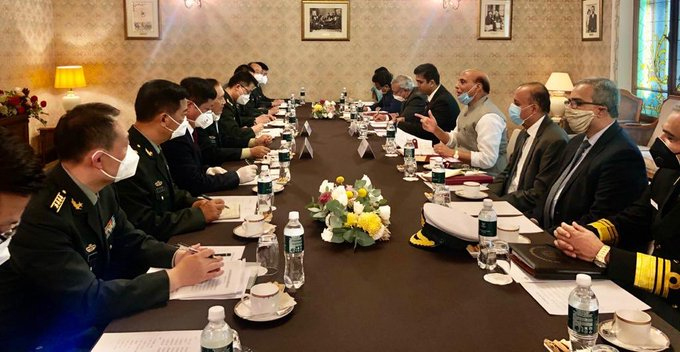NE NEWS SERVICE
MOSCOW/NEW DELHI, SEPT 4
Defence Minister Rajnath Singh met his Chinese counterpart Gen. Wei Fenghe in Moscow on Friday in the first highest level contact after border tension erupted in Ladakh in May as the Indian leader said peace and security in the region demands a climate of trust, non-aggression, peaceful resolution of differences and respect for international rules.
Raksha Mantri Shri @rajnathsingh met his Chinese counterpart General Wei Fenghe on the side-lines of the Joint Meeting of the Heads of Defence Ministers of #SCO, Commonwealth of Independent States & Collective Security Treaty Organisation members countries, in Moscow, today. pic.twitter.com/TwR83YEHci
— A. Bharat Bhushan Babu (@SpokespersonMoD) September 4, 2020
Singh’s comments seen as a veiled message to China ahead of his bilateral talks with Wei came at a meeting of the Defence ministers of the Shanghai Cooperation Organisation (SCO) in the Russian capital.
According to Indian government sources, the bilateral meeting was requested by the Chinese defence minister. External Affairs Minister S Jaishankar has previously held telephonic talks with his Chinese counterpart Wang Yi on the border standoff.
Defence Secretary Ajay Kumar and Indian Ambassador to Russia D B Venkatesh Varma are part of the Indian delegation at the talks that began at around 9:30 pm (IST) at a prominent hotel in Moscow.
The meeting took place amid heightened tensions between the two countries triggered by China’s fresh attempts to occupy Indian territory in the southern bank of Pangong lake in eastern Ladakh.
As both sides increased deployment of troops in Ladakh, Chief of Army Staff Gen MM Naravane, wrapping up a two-day visit to the region, said the situation along the Line of Actual Control (LAC) is “tense” but added that the nation can count on the Indian Army.
“The situation along the LAC is tense. We have undertaken precautionary deployment in some areas. The troops are prepared for all contingencies that may arise. All these actions have been carried out only along the LAC,” he said after holding a series of meetings with top army commanders.
In his address at the SCO meet, Rajnath Singh referred to the Second World War and said its memories teach the globe the “folies of aggression” of one state upon another that brings “destruction” to all.
Separately, Foreign Secretary Harsh Vardhan Shringla said there will be no compromise on India”s sovereignty and territorial integrity, and asserted it cannot be “business as usual” in bilateral ties unless there are peace and tranquillity in the border areas. At the same time, he said India is open to resolving outstanding issues through dialogue.
“This is one of the most serious challenges we have faced in many decades,” he said, adding “we have not seen this magnitude of amassing of forces on the border also in recent years”. Shringla was speaking at an Indian Council of World Affairs (ICWA) webinar.
In the meantime, Brigade commanders of Indian and Chinese armies held a nearly three-hour-long interaction near Chushul in eastern Ladakh, exploring ways to bring down tensions. The outcome of the interaction is not immediately known.
Three rounds of Brigade commander-level talks between the two armies earlier this week remained inconclusive.
Tensions flared up again in eastern Ladakh after China unsuccessfully attempted to occupy Indian territory in the southern bank of Pangong lake five days ago when the two sides were engaged in diplomatic and military talks to resolve the prolonged border row.
India occupied a number of strategic heights on the southern bank of Pangong lake and strengthened its presence in Finger 2 and Finger 3 areas in the region to thwart any Chinese actions. China has strongly objected to India”s move. However, India has maintained that the heights are on its side of the LAC.
In Beijing, Chinese Foreign Ministry spokesperson Hua Chunying told a media briefing that on issues left over from history, like the boundary issue, China always believes finding a fair, reasonable, mutually acceptable solution through peaceful consultations.









